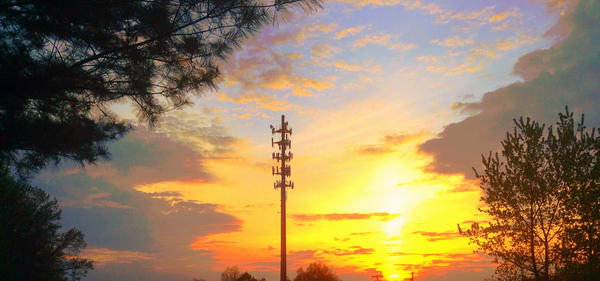
Wireless Carriers Lobby For Access To ‘Street Furniture’ In Washington
Listen
The next generation of cell technology will feature smaller antennas in more places and will eventually lead to 5G connectivity. Wireless carriers are pushing legislation in Washington state to give them access to power poles, street lights and other public infrastructure for placement of the small antennas.
But this has created a fight with cities.
On 5G, a movie that now takes minutes to download will take just seconds.
“It sounds super sexy and we hope that it is,” said Beth Cooley with The Wireless Association. It’s a national trade group that represents all of the nation’s wireless carriers.
Cooley told a panel of Washington lawmakers earlier this year that a robust 5G network will require a 250,000 of these new small cell sites nationwide.
“Small cell technologies are generally installed on street furniture is what we call it — utility poles, street lights, traffic signal poles — and as I said this is sweeping the country and very hyper competitive amongst the cities and the states right now,” Colley said.
The race for 5G
Verizon has already announced Seattle as a test city for 5G later this year. Still the wireless industry is pushing the idea that if Washington doesn’t move quickly to pave the way for small cell sites, then other states will get 5G first.
In Olympia, the industry is putting on a full court press. And that’s what’s triggered the fight with cities.
Lobbyists for the wireless industry are pushing legislation that would require cities and towns to let companies like Verizon install small cell sites on public infrastructure — and limit how much rent the cities can charge.
The sponsor of the bill in the Washington Senate is Republican Doug Ericksen. He also makes the competition argument.
“And we got a choice, we can be the broadband super highway or we can look like I-5 through Seattle at 5 o’clock in the afternoon,” Ericksen said.
Ericksen said 5G doesn’t just mean faster downloads — it means jobs and economic development. But he believes current local zoning and permitting standards are an impediment to 5G buildout.
“Washington state right now has a terrible reputation for being a bad place to be able to deploy wireless,” Ericksen said. “We need to fix that so we can get those companies to bring the money here first and not last.”
Cities vs. carriers
But Ericksen’s approach is not going over well with the cities who say Ericksen and the wireless industry want to preempt local control.
“Verizon and other carriers would like to access the right-of-way almost without limitation and virtually free of charge,” said Tom Brubaker, an attorney for the city of Kent.
So far a compromise has been elusive. But Democratic state Sen. Reuven Carlyle believes there’s a sweet spot.
“We don’t want cell sites hanging from every single streetlamp and pole without question, we want it done in a responsible, thoughtful way and that’s what this is about,” he said.
According to The Wireless Association, 5G legislation is under consideration in some 30 states this year, although it won’t say where or provide details. The corporate-backed American Legislative Exchange Council, also known as ALEC, has also passed a resolution calling on states to “streamline” local permitting of small cell technology.
Ohio, for one, has already passed a law that requires cities and towns to approve small cell applications within 90 days — a provision that’s also in the Washington state proposal.
Ericksen said he wants a bill this year and he doesn’t want a lot of discussion about it. He accuses opponents of “standing in the way” of a technological revolution.
“I have a service people want, I got the people that will provide it. And I have barriers in the middle,” Ericksen said. “And my legislation takes out those barriers so people can get the services they want.”
A boost for rural broadband?
A second provision in Ericksen’s bill deals with broadband and cable build-out to more rural parts of Washington. It would require public utility districts, which serve mostly rural areas, to adopt to the same rules and rates for pole attachments as investor-owned utilities like Puget Sound Energy or Avista.
“In Washington today, the rates we pay for municipal and PUD poles are not certain and they widely vary,” Comcast’s Rhonda Weaver told lawmakers.
The Washington Public Utility District Association opposes the proposed changes.
“We don’t believe that the pole attachment rates that are currently in place are an impediment to the deployment of rural broadband,” said George Caan, the Association’s executive director.
“We think that working cooperatively with the communication companies to bring rural broadband is the right way to go,” Caan said, “not unilaterally telling us how much we should charge.”
Ericksen’s bill missed a key cut-off deadline on March 8 for policy measures to pass out of their house of origin. But it could be revived if deemed necessary to implement the final budget.
9(MDAyNTQ1NzQ1MDEyMjk0OTcxNTI4MzljZQ001))
Related Stories:

Programas Head Start reabren en el centro de Washington
Más de 400 niños de varias comunidades del centro de Washington regresaron a sus aulas tras la llegada de los fondos federales para los programas Early Head Start y Head Start de Inspire Development Centers.

One woman finds healing by caring for wild animals on the Palouse
Haku the pig, a resident at Palouse Wildlife Rescue and Rehabilitation, draws lots of attention from visitors. (Credit: Ryan Law) Listen (Runtime 3:49) Read It’s dark inside this large red

Head Start programs reopen in Central Washington
More than 400 children in Central Washington are returning to their classrooms following the arrival of federal funds for Early Head Start and Head Start programs at Inspire Development Centers. The organization offers early childhood education programs to low-income children through various centers.












